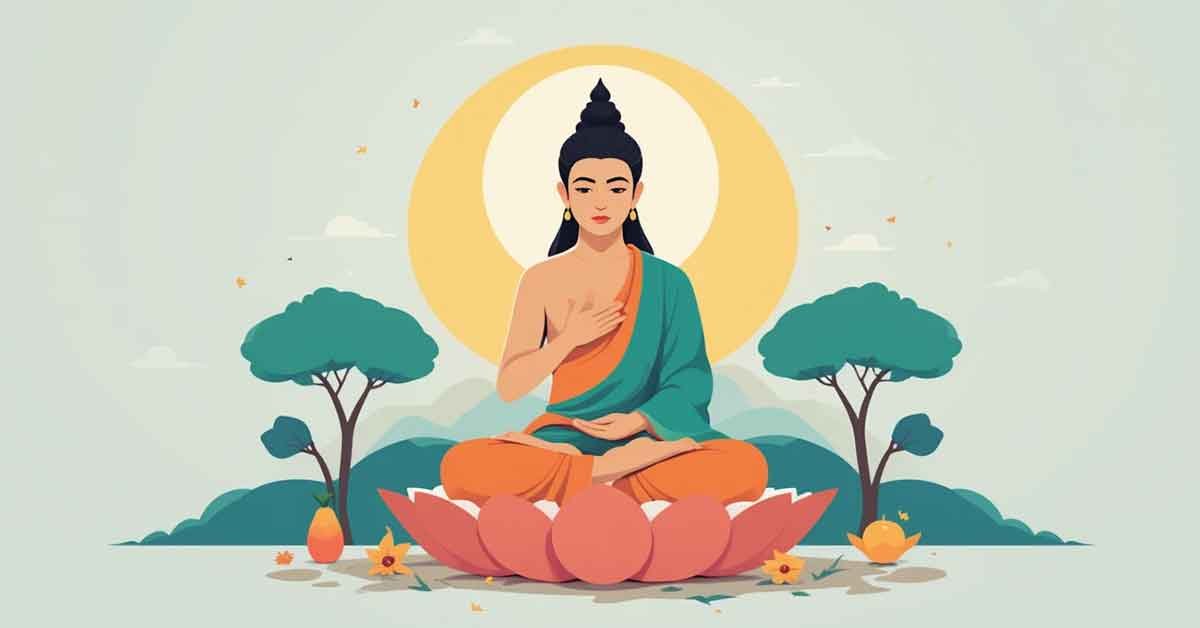Introduction:
Imagine a young student sitting at the feet of their guru, absorbing every word of wisdom, every lesson that shapes their future. This timeless scene captures the essence of Guru Purnima—a day deeply rooted in Indian culture, dedicated to honoring teachers, mentors, and spiritual guides. Celebrated on the full moon day (Purnima) of the Hindu month of Ashadha (June-July), Guru Purnima is more than just a festival; it’s a profound expression of gratitude for those who illuminate our paths.
In 2024, Guru Purnima was observed on July 21, while in 2025, it fell on July 10. These dates hold special significance for millions across India, where the festival transcends religious boundaries, uniting Hindus, Buddhists, Jains, and even secular communities in reverence for knowledge and guidance. Whether it’s the spiritual wisdom of a guru or the academic mentorship of a teacher, Guru Purnima reminds us of the transformative power of learning.
This comprehensive guide delves into the rich tapestry of Guru Purnima, exploring its significance, history, celebrations, and more. We’ll also share inspirational quotes and wishes to help you honor your gurus, ensuring this guide is both informative and heartfelt. So, let’s embark on this enlightening journey together, celebrating the timeless tradition of Guru Purnima.
Significance of Guru Purnima
Guru Purnima holds deep cultural and spiritual significance across India, reflecting the country’s diverse traditions. The festival celebrates the guru-shishya (teacher-student) relationship, a cornerstone of Indian culture that emphasizes the transmission of knowledge and wisdom.
In Hinduism
Known as Vyasa Purnima, Guru Purnima commemorates the birth of Maharishi Ved Vyasa, the revered sage who compiled the Vedas and authored the Mahabharata. Vyasa is considered the first guru in many spiritual lineages, symbolizing the eternal role of teachers in preserving and transmitting knowledge. Hindus celebrate by honoring their spiritual gurus through rituals like Guru Puja, seeking blessings and guidance on their spiritual journey. The day underscores the belief that a guru is a dispeller of darkness, guiding disciples toward enlightenment.
In Buddhism
For Buddhists, Guru Purnima marks the day when Gautama Buddha delivered his first sermon at Sarnath, Uttar Pradesh, after attaining enlightenment. This sermon, known as the Dhammacakkappavattana Sutta, set the Wheel of Dharma in motion and established the Buddhist sangha (community). Buddhists observe this day by reflecting on Buddha’s teachings, chanting sutras, and honoring their spiritual mentors. It also marks the beginning of Vassa, the rainy season retreat for monks.
In Jainism
Though less widely celebrated, Guru Purnima is significant in Jainism as it commemorates the day when Mahavira, the 24th Tirthankara, accepted his first disciple, Gautama Swami. Jains use this day to venerate their spiritual leaders and reflect on principles like non-violence (ahimsa), truth (satya), and self-discipline.
Beyond Religion
In modern India, Guru Purnima has evolved into a broader celebration of all forms of teachers—academic, professional, and life mentors. Students honor their school and college teachers, recognizing their role in shaping young minds and futures. This secular aspect makes Guru Purnima a unifying festival that celebrates the universal value of mentorship.
Read More: Amavasya 2025: Dates, Significance, and Rituals
History of Guru Purnima
The history of Guru Purnima is as ancient as Indian civilization itself, with roots in mythology and historical events that have shaped its significance.
Hindu Origins
In Hindu tradition, Guru Purnima is linked to Veda Vyasa, born on this day to sage Parashara and Satyavati. Vyasa is credited with dividing the single Veda into four parts—Rigveda, Yajurveda, Samaveda, and Atharvaveda—to make them accessible to different groups. He also authored the Mahabharata, one of the world’s longest epic poems, and compiled the Puranas, essential texts for Hindu mythology and philosophy. His work laid the foundation for the guru-shishya parampara, where knowledge is passed down through generations. Vyasa’s contributions make him a pivotal figure in Hindu spirituality, and his birthday is celebrated as Vyasa Purnima.
Buddhist Significance
For Buddhists, Guru Purnima commemorates Buddha’s first teaching after his enlightenment under the Bodhi tree in Bodh Gaya. Traveling to Sarnath, Buddha shared his insights with five ascetics, delivering the Dhammacakkappavattana Sutta, which outlined the Four Noble Truths and the Eightfold Path. This event marked the birth of the Buddhist sangha and the spread of Buddhism. The day also coincides with the start of Vassa, a three-month retreat during the rainy season when monks focus on meditation and study.
Jain Tradition
In Jainism, Guru Purnima is tied to Mahavira’s acceptance of his first disciple, Gautama Swami, symbolizing the beginning of his teaching mission. It’s a day to honor Jain gurus and reflect on the path to spiritual liberation through principles like non-violence and truth.
Evolution Over Time
Over centuries, Guru Purnima has grown from a religious observance to a cultural celebration that includes academic teachers and mentors. This evolution reflects India’s deep respect for education and mentorship, making Guru Purnima a day of universal gratitude.
How Guru Purnima is Celebrated
Guru Purnima is celebrated with fervor and devotion across India and other parts of South Asia, with rituals and traditions varying by region and community.
In India
- Hindu Celebrations: Devotees begin the day with a bath and wear clean clothes to symbolize purity. They perform Guru Puja, offering flowers, fruits, incense, and sweets to their gurus. A key ritual is padapuja, where disciples wash their guru’s feet with milk and water as a sign of humility. In ashrams and mathas (monasteries), special prayers, discourses, and bhajans (devotional songs) are organized. Some devotees recite the Guru Gita, a sacred text that extols the virtues of the guru. Temples dedicated to Veda Vyasa often hold special pujas with floral offerings and prasad distribution.
- Educational Institutions: Students honor their teachers with gifts like books, pens, or flowers. Cultural programs, speeches, and presentations are common, where students express gratitude for their mentors’ guidance. In schools and colleges, assemblies are held to celebrate the teacher-student bond.
- Regional Variations: In South India, some communities organize elaborate feasts and distribute prasad. In North India, devotees may participate in processions or community gatherings. In rural areas, traditional rituals like havan (fire ceremonies) are common.
In Nepal
Guru Purnima is celebrated as Teacher’s Day in Nepal. Students organize fanfares and processions, presenting their teachers with traditional gifts like topi (hats), garlands, and sweets. Schools and colleges hold special assemblies where teachers are felicitated for their contributions to society.
In Buddhist Communities
Buddhists observe Guru Purnima with meditation, chanting of sutras, and listening to teachings from senior monks. The day is a time for reflection on Buddha’s path to enlightenment and recommitment to the practice of Dharma. In some monasteries, devotees adopt ascetic practices, such as abstaining from meat or alcohol, to honor the occasion.
Modern Celebrations
With the rise of social media, many share Guru Purnima wishes, quotes, and images on platforms like WhatsApp and Facebook. Professionals also honor mentors in fields like business or arts, reflecting the festival’s growing secular appeal.
Guru Purnima 2024 and 2025 Dates
For those planning to observe Guru Purnima, knowing the exact dates is essential. The festival is based on the Hindu lunar calendar, falling on the full moon day of Ashadha.
| Year | Date | Day | Purnima Tithi Timing |
|---|---|---|---|
| 2024 | July 21 | Sunday | Begins: 05:59 PM, July 20 Ends: 03:46 PM, July 21 |
| 2025 | July 10 | Thursday | Begins: 01:36 AM, July 10 Ends: 02:06 AM, July 11 |
These dates are sourced from reliable calendars like Drik Panchang and may vary slightly by region due to local traditions. Since today is July 19, 2025, Guru Purnima 2025 has already passed, but its significance remains timeless for reflection and planning for future celebrations.
Inspirational Guru Purnima Quotes and Wishes
To help you express gratitude to your gurus, here are some inspirational quotes and heartfelt wishes that capture the essence of Guru Purnima:
Quotes
- “A guru is like a candle—consumes itself to light the way for others.”
- “The best teachers show you where to look but not what to see.”
- “Guru is the ladder between earth and heaven.”
- “With the guidance of a true guru, your life becomes divine.”
- “What the teacher is, is more important than what he teaches.”
- “Let no man in the world live in delusion. Without a guru, no one can cross over.” – Guru Nanak
- “A true teacher not only imparts knowledge but awakens the soul.”
- “A guru teaches by example, not just by words.”
- “The influence of a great teacher lasts a lifetime.”
- “To follow the path of a guru is to walk in the direction of truth.”
Wishes
- “Happy Guru Purnima! May the light of your guru always guide you towards wisdom and peace.”
- “On this sacred day, I bow to my guru with love and reverence. Happy Guru Purnima!”
- “May your life be blessed with the grace of your guru. Wishing you a peaceful Guru Purnima.”
- “Let us honor our teachers who shaped us. Happy Guru Purnima!”
- “Gurus are the guiding stars in the journey of life. Gratitude and respect on Guru Purnima.”
- “Happy Guru Purnima! May your life be filled with eternal wisdom and serenity.”
- “On this auspicious day, may you find peace and enlightenment. Happy Guru Purnima!”
- “Wishing you a day filled with joy and spiritual growth. Happy Guru Purnima!”
- “May the blessings of your guru lead you to success and happiness. Happy Guru Purnima!”
- “Thank you for being a guiding light and a source of wisdom. Happy Guru Purnima!”
| Aspect | Traditional Celebrations | Modern Celebrations |
|---|---|---|
| Focus | Spiritual gurus, religious rituals | Spiritual and academic teachers, mentors |
| Activities | Guru Puja, padapuja, temple visits | Cultural programs, social media wishes |
| Gifts | Flowers, fruits, dakshina | Books, pens, digital cards |
| Setting | Ashrams, temples | Schools, colleges, online platforms |
FAQs: About Guru Purnima
What is Guru Purnima?
Guru Purnima is a festival celebrated on the full moon day of Ashadha to honor gurus, teachers, and mentors. It’s a day to express gratitude for their guidance in spiritual, academic, and personal growth.
Why is Guru Purnima Celebrated?
It’s celebrated to honor Veda Vyasa in Hinduism, Buddha’s first sermon in Buddhism, and spiritual leaders in Jainism. It also recognizes all forms of teachers who impart knowledge and wisdom.
How is Guru Purnima Celebrated?
Celebrations include Guru Puja, offering gifts to gurus, visiting temples or ashrams, and participating in cultural programs. Students often honor their teachers with tokens of appreciation.
When is Guru Purnima in 2024 and 2025?
Guru Purnima 2024 was on July 21 (Sunday), and Guru Purnima 2025 was on July 10 (Thursday).
Can I Celebrate Guru Purnima Without a Personal Guru?
Yes! You can honor any teacher or mentor who has impacted your life, such as school teachers, authors, or life coaches. Use the day for self-reflection and learning.
What Are Traditional Gifts for Guru Purnima?
Common gifts include flowers, fruits, sweets, books, and clothing. Some offer dakshina (monetary offerings) as a sign of respect.
Is Guru Purnima a Public Holiday in India?
Guru Purnima is not a public holiday but is widely observed in educational institutions and spiritual centers across India.
How is Guru Purnima Different from Teachers’ Day in India?
Guru Purnima has a spiritual connotation, often focusing on spiritual gurus, while Teachers’ Day (September 5) primarily honors academic teachers.
Conclusion: Embracing the Spirit of Guru Purnima
As we conclude this exploration of Guru Purnima, let’s reflect on its timeless message: knowledge is light, and gurus are its bearers. From Veda Vyasa’s monumental contributions to Buddha’s transformative teachings, Guru Purnima reminds us of the power of mentorship in shaping individuals and societies.
On this day, let’s not only honor our gurus but also commit to being lifelong learners and mentors ourselves. Whether it’s through a simple gesture of gratitude or a deeper dive into spiritual practices, Guru Purnima invites us to celebrate the sacred bond between teacher and student.
So, as you reflect on Guru Purnima 2024 or look back on 2025, remember: “Guru Brahma, Guru Vishnu, Guru Devo Maheshwara; Guru Sakshat Parabrahma, Tasmai Shri Gurave Namah.” (The guru is the creator, preserver, and destroyer; the guru is the absolute Brahman itself. Salutations to that guru.)











